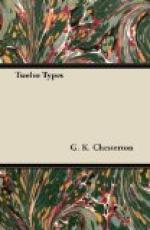Scott is separated, then, from much of the later conception of fiction by this quality of eloquence. The whole of the best and finest work of the modern novelist (such as the work of Mr Henry James) is primarily concerned with that delicate and fascinating speech which burrows deeper and deeper like a mole; but we have wholly forgotten that speech which mounts higher and higher like a wave and falls in a crashing peroration. Perhaps the most thoroughly brilliant and typical man of this decade is Mr Bernard Shaw. In his admirable play of ‘Candida’ it is clearly a part of the character of the Socialist clergyman that he should be eloquent, but he is not eloquent, because the whole ‘G.B.S.’ condition of mind renders impossible that poetic simplicity which eloquence requires. Scott takes his heroes and villains seriously, which is, after all, the way that heroes and villains take themselves—especially villains. It is the custom to call these old romantic poses artificial; but the word artificial is the last and silliest evasion of criticism. There was never anything in the world that was really artificial. It had some motive or ideal behind it, and generally a much better one than we think.
Of the faults of Scott as an artist it is not very necessary to speak, for faults are generally and easily pointed out, while there is yet no adequate valuation of the varieties and contrasts of virtue. We have compiled a complete botanical classification of the weeds in the poetical garden, but the flowers still flourish neglected and nameless. It is true, for example, that Scott had an incomparably stiff and pedantic way of dealing with his heroines: he made a lively girl of eighteen refuse an offer in the language of Dr Johnson. To him, as to most men of his time, woman was not an individual, but an institution—a toast that was drunk some time after that of Church and King. But it is far better to consider the difference rather as a special merit, in that he stood for all those clean and bracing shocks of incident which are untouched by passion or weakness, for a certain breezy bachelorhood, which is almost essential to the literature of adventure. With all his faults, and all his triumphs, he stands for the great mass of natural manliness which must be absorbed into art unless art is to be a mere luxury and freak. An appreciation of Scott might be made almost a test of decadence. If ever we lose touch with this one most reckless and defective writer, it will be a proof to us that we have erected round ourselves a false cosmos, a world of lying and horrible perfection, leaving outside of it Walter Scott and that strange old world which is as confused and as indefensible and as inspiring and as healthy as he.



